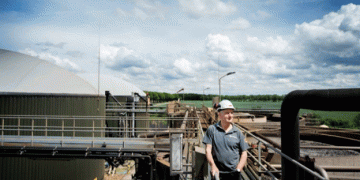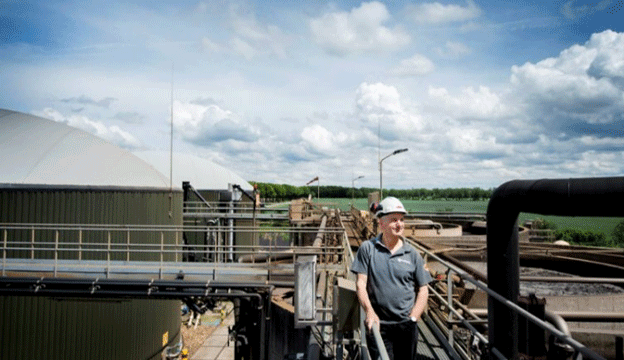EcoFuels is an example of circular agriculture, converting plant waste from horticulture and food processing into electricity, heat, CO2 and green gas, making a significant contribution to the energy transition.
EcoFuels, a division of Laarakker Groenteverwerking in Wells, represents innovation in sustainable agriculture. Using plant waste from both its own operations and the food industry as a whole, EcoFuels produces various types of energy, including electricity, heat and green gas. The initiative was inspired by the need to effectively manage organic waste while contributing to renewable energy goals.
From field to energy: the EcoFuels path
EcoFuels originated from Laarakker Groenteverwerking, a company founded in the 1960s by Piet Laarakker that specialized in growing, harvesting, processing and selling field vegetables for the production of frozen and canned foods. Under the leadership of Maurice Coolen and a dedicated management team, EcoFuels has developed innovative methods for converting organic waste into valuable energy resources.
The company works with contract farmers across Europe, growing approximately 9,000 hectares of vegetables, including above-ground crops such as peas and beans, and underground crops such as carrots. While much of the product is destined for human consumption or animal feed, residual waste forms the basis of EcoFuels’ energy production process.
Innovative energy solutions from organic waste
The idea of converting organic waste into energy came from Frank Laarakker more than twenty years ago. Faced with limitations in disposing of waste on its own land due to expansion, the concept of using anaerobic digestion to convert waste into biogas arose. In 2006, a special building with digesters and combined heat and power plants (CHP) was built on the territory of Laarakker.
Using thermophilic digestion, which occurs at higher temperatures than traditional methods, EcoFuels maximizes biogas yield. The biogas is then converted into heat and electricity using CHP. Each year, EcoFuels processes 100,000 tons of low-grade organic waste, producing 17 million kilowatt-hours of clean electricity. This electricity powers Laarakker and EcoFuels, with excess energy returned to the grid.
Green gas and more
A notable achievement of EcoFuels is the production of environmentally friendly gas, biogas of improved quality to natural gas. One of the pioneers in this field since 2011, EcoFuels currently converts 40% of the biogas produced into 3 million cubic meters of green gas annually, which is fed into the natural gas network. The remaining biogas is used to produce electricity and heat. This process also produces green CO2 supplied to the greenhouse horticulture sector, demonstrating full recycling of organic waste streams.
Challenges and future directions
The path to mastering thermophilic digestion and modernizing biogas was not easy. However, EcoFuels has refined these processes to a high degree of efficiency. The company continues to innovate by exploring new energy production opportunities, including the potential of hydrogen and liquid biofuels such as bio-LNG.
Plans are currently underway to increase green gas production to 10-12 million cubic meters per year, in line with the Dutch government’s goal of increasing green gas production to 2 billion cubic meters by 2030, thereby reducing dependence on fossil fuels.
- Latest
- Trending































